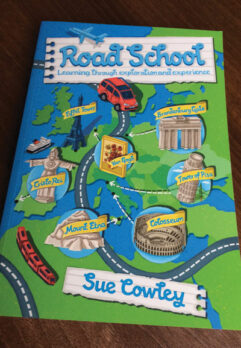The number of parents home-schooling their children has increased 65 per cent over the past six years.
Sue Cowley’s Road School meets these parents and interested educationists and, under a wandering star, offers them warmth, wit and practical tips on getting their adventures underway.
Cowley writes an honest, funny and heart-warming account of the adventures she, her partner and their children enjoy as they take a few months off school to experience life on the road. It is a manifesto for the power of knowing your own children, establishing yourself as your child’s first teacher and witnessing deep learning in the face of real experiences.
Cowley’s style is conversational and the accounts have the familiar resonance of any family meal, holiday or gathering. There are no rose-coloured specs regarding the reality of educating your own children or spending that much time in close quarters – we see the arguments, the tears and the laughter – yet the learning experiences they all enjoy are palpable.
Fostering the intrinsic motivation to learn is writ large and evidenced again and again in the touching “aha” moments experienced by the children. When, for example, the family visit Anne Frank’s house in Amsterdam, the emotion is raw, for Sue in particular. Yet, it isn’t until months later, on their return to the UK, that her daughter Edith takes Frank’s diary from the bookshelf: “As she turned the final few pages, tears began to pour down her face. Her small body was wracked with sobs. She was inconsolable with grief for Anne.”
In some ways Road School is a lyrical piece, celebrating everything that the typical school experience fails to fulfil
We have all had children in our classrooms with an enthusiasm for something.
The thread, which covers Edith’s passion for Leonardo da Vinci, is a particularly interesting one for the teachers among us. As the family make a cross-sea, cross-land dash to deliver Edith to her all-time favourite painting, The Last Supper, we are reminded what gifts lie in the pursuit of our passions. In front of the painting Edith’s jaw drops and one gets the impression that this wish fulfilled has made real for her the connection between dreams and their manifestation.
No grand or carefully orchestrated plan is described in Road School. Instead it is a slightly haphazard, loosely organised yet purposeful path through Europe and beyond.
Likewise, the short chapters comprise several moments that bear witness to learning opportunities, with helpful interspersed sections of practical tips on navigating the country explored. Each is followed by a section of support and information about the practicalities of home schooling, including details of the legal framework and parental responsibilities.
In one of the sections in which Cowley makes her views on the education system plain, she points out that it is “pretty much unheard-of for a three-year-old to be disaffected with education, but it is perfectly normal to talk about a thirteen-year-old feeling this way”. It is clear that the beliefs underpinning the book are that curiosity and engagement through experiential learning need to regain territory in the face of testing regimes and a disembodied national curriculum.
The teacher in me didn’t find in Road School an answer to how to bring learning through exploration and experience to bear in my school. Admittedly Cowley doesn’t set out to provide these answers, but this teacher couldn’t help feeling a little disappointed that I couldn’t do more with the insights she provides.
In some ways Road School is a lyrical piece, celebrating everything that the typical school experience fails to fulfil, and that can be a hard read. That said, the parent in me thoroughly enjoyed the book.
I felt that I had just read a love letter to family life, to reconnecting with loved ones and to time well spent. A letter that made me want to pack my bags and, little one in tow, get learning.













Your thoughts